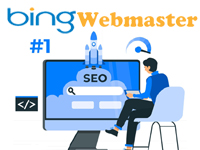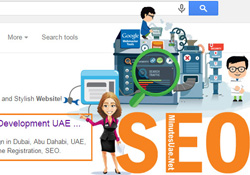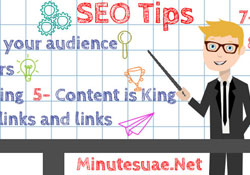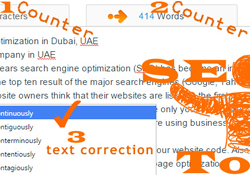How can SEO increase website traffic?

Improving SEO increase website traffic by enhancing the visibility and ranking of your website on search engine results pages. If a website is top ranked, then it will receive a lot of organic traffic. However, many website owners do not know what SEO is and why it is very important for their websites. Therefore, we should clarify some details about SEO.
What is SEO?
SEO, or Search Engine Optimization, is the practice of improving the visibility of a website. It is also the process of enhancing the website ranking in a search engine's results. In brief, the visits which come from the search engines are called organic traffic. SEO includes Keyword Research, On-Page SEO, Off-Page SEO, Technical SEO, Content Creation, and User Experience (UX).
Improving SEO increase website traffic
1. Keyword Research is the process of finding and analyzing what audiences search for content in search engines like Google. Accordingly, it is an important component of search engine optimization (SEO) and digital marketing. Effective keywords research help boost your SEO efforts, driving web traffic and potential customers to your website.
2. On-Page SEO refers to the optimization of individual web pages to rank higher and earn more relevant traffic in search engines. It involves both the content and HTML source code of a page that can be optimized.This includes optimizing content, meta tags, headers, and images.
3. Off-page SEO refers to the actions taken outside of the website to impact your rankings within search engine results pages (SERPs). This mainly involves building backlinks from other reputable websites, but also includes increasing engagement and shares on social media, influencer outreach, and more. This results in improving your website’s popularity, authority, driving more traffic, and enhancing your overall search engine rankings.
4. Technical SEO involves optimizing your website's infrastructure to ensure that search engines can crawl and index your site effectively. It includes various aspects such as site speed, mobile-friendliness, XML sitemaps, indexing, crawlability, site architecture and more. By focusing on technical SEO, you can ensure that your website is well-optimized for search engines, providing a solid foundation for your overall SEO strategy. This will help improve your site’s visibility, usability, and ultimately, its rankings in search engine results.
The goal of SEO is to increase the quantity and quality of traffic to your website through organic search engine results.
5. Content Creation is a fundamental aspect of digital marketing and SEO. It involves writing unique content to attract your target audience. Additionally, effective high-quality, relevant, and engaging content writing can drive traffic, build brand authority, and convert visitors into customers. Writing SEO Optimized content which includes your targeted search keywords will support your overall marketing goals.
6. User Experience (UX) focuses on providing a positive experience for users when they interact with your website or digital product. Good UX can lead to higher user satisfaction, increased engagement, and better conversion rates. Besides, focusing on User Experience aspects, you can create a more enjoyable and efficient experience for your users, leading to higher satisfaction and better business results.
Why is SEO important and how can SEO increase website traffic?
SEO is important for several reasons:
1. Increased Visibility and Traffic typically refer to the growth of an online presence, leading to more people visiting a website or engaging with online content. This helps increase visibility and drive more traffic to your website or online content.
2. Building credibility and trust is crucial for any brand, business, or individual looking to establish a strong and lasting presence. Websites that appear on the first page of search results are often perceived as more credible and trustworthy by users. SEO strategies can enhance credibility and trust of websites.
3. Better User Experience: SEO practices improve the usability and overall experience of a website. Good design which is easy to use and has a simple structure of a website encourages users to engage with your products. This can lead to higher engagement, lower bounce rates, and more conversions.
4. Competitive Advantage refers to the attributes that allow a company to outperform its competitors who are targeting the same keywords and audience. These attributes can be a variety of factors that give the company an edge in its industry. This allows a company to provide high quality services or products and be cheaper than its competitors. This results in generating more sales and getting higher profits. These advantages can be temporary where the competitors can easily replicate them. That is why you should know that the key to long-term success depends on continuous innovation.
In essence, SEO is important for enhancing online presence, driving targeted traffic, and achieving sustainable business growth.
5. Cost-effectiveness is a critical concept in economics, healthcare, business, and other fields where resources are limited and must be allocated efficiently. It involves comparing the relative expenses and outcomes of different courses of action to determine which offers the best value for money. Compared to paid advertising, organic SEO is more cost-effective in the long run. While there are costs associated with SEO, the organic traffic it generates is free. Most of the organic traffic is web traffic from Google. As Google is the most popular search engine.
6. Long-Term Results: SEO can provide lasting results. Once your site is well-optimized, maintaining its position requires less effort than continuously paying for ads.
7. Targeted Traffic: Improving SEO increase website traffic and visitors who are actively searching for information related to your products or services. In this case, it results in leading to higher quality traffic and better conversion rates.
8. Brand Awareness: Higher visibility in search results increases awareness of your brand. Even if users don’t click on your site initially, seeing your name frequently can build recognition.
What's the relationship between SEO and marketing?
SEO and marketing are closely related but different fields.
SEO is simply a branch under digital marketing. It focuses specifically on optimizing a website to improve its visibility and ranking in search engine results, ultimately driving organic traffic.
Marketing, on the other hand, includes a broader range of activities aimed at promoting products or services, building brand awareness, and driving sales. This includes various channels such as advertising, content marketing, social media marketing, email marketing, and more.
While SEO is a crucial component of digital marketing, it's just one piece of the process. Effective marketing strategies often integrate multiple channels, including SEO, to reach and engage target audiences across various touchpoints.
What is the difference between SEO and SEM?
SEO (Search Engine Optimization) and SEM (Search Engine Marketing) are related but different fields:
Both SEO and PPC are ways to market your business in search engines.
1. SEO (Search Engine Optimization): SEO involves optimizing your website and its content to improve its visibility and ranking in organic (non-paid) search engine results. Above all, it focuses on techniques like keyword research, on-page optimization, technical optimization, and link building. As a result, it will increase your website's authority and relevance in the eyes of search engines.
2. SEM (Search Engine Marketing): SEM, on the other hand, is a broader term that includes various strategies to promote websites. This happens, in general, by increasing their visibility in search engine results pages through paid advertising. This typically involves techniques like pay-per-click (PPC) advertising. After that, advertisers bid on keywords relevant to their target audience and pay each time their ad is clicked. While SEO is focused on organic results, SEM involves both organic (SEO) and paid search (PPC) strategies.
In summary, SEO focuses on optimizing your website to improve organic search visibility, while SEM involves both organic and paid strategies to increase visibility in search engine results pages.
How do search engines work?
Search engines work through a multi-step process that includes crawling, indexing, and ranking web content to provide the most relevant results to users' search keyword. Here’s a detailed look at each step:
1. Crawling is the process by which search engines discover new and updated web pages. Search engines use bots, known as spiders or crawlers, to scan the internet for content. These bots follow links from one page to another, constantly searching for new data.
2. Indexing involves storing and organizing the content found during the crawling process. Once a page is crawled, the search engine processes its content, including text, images, and other media. This information is then stored in the search engine’s index, a massive database of all the web content it has discovered. The index is essentially a library of billions of web pages.
3. Ranking determines the order in which indexed pages appear in the search engine results pages (SERPs) for a given search keyword. Search engines use complex algorithms to rank pages. These algorithms consider numerous factors, including keywords, relevance, site structure, backlinks, user experience, and many others. The goal is to provide the most relevant and authoritative results for any given search keyword.
Key Factors in Search Engine Algorithms
- Relevance: How well the content of a page matches the search keyword.
- Authority: Determined by the quality and quantity of backlinks from other websites.
- User Experience: Factors such as page load speed, mobile-friendliness, and easy navigation.
- Content Quality: Original, comprehensive, and frequently updated content tends to rank better.
- Search Intent: Understanding whether the user is looking for information, looking to make a purchase, or seeking a specific website.
The Search Process
1. User Search Keyword: The process starts when a user types a search keyword into a search engine.
2. Search Engine Algorithm: The search engine’s algorithm processes the search keyword, considering numerous factors to find the most relevant results.
3. Results Retrieval: The search engine retrieves the most relevant pages from its index.
4. Ranking and Display: The results are ranked based on relevance and displayed on the SERP.
By continuously refining their algorithms, search engines strive to improve the accuracy and relevance of the search results they provide to users.
How does SEO increase website traffic?
SEO, or Search Engine Optimization, is the practice of optimizing your website to increase its visibility and ranking in search engine results pages (SERPs). It involves various strategies like keyword research, content creation, on-page optimization, technical SEO, and link building. The goal is to make your website more attractive to search engines, thereby driving organic traffic and improving your online presence.
How does Google arrange search engines results?
Google arranges search engine results using a complex algorithm. It takes into account various factors to determine the most relevant and useful results for a given search keyword. Some key factors that influence the ranking of search results include:
1. Relevance: Google evaluates how well a webpage matches the user's search keyword. Optimizing your content to include relevant keywords, phrases, and topics can improve its relevance to specific search queries. Pages with content closely related to the search keyword are more likely to rank higher.
2. Quality: Google evaluates the quality of content on a webpage, including factors like originality, depth, and accuracy. Pages with high-quality unique content are more likely to rank higher.
3. Authority: Google considers the authority of a webpage, which is often measured by the quantity and quality of backlinks pointing to that page. Pages with more authoritative backlinks are viewed as more trustworthy and may rank higher.
4. User Experience: Google takes into account factors related to the user experience, such as page load speed, mobile-friendliness, and ease of navigation. Pages that provide a positive user experience are more likely to rank higher.
5. Freshness: Google may prioritize newer content for certain queries, especially for topics that require up-to-date information.
6. Location and Personalization: Google may personalize search results based on factors like the user's location, search history, and preferences.
Google's algorithm constantly evaluates and updates these factors, together with hundreds of others, to deliver the most relevant and useful search results to users.
How can SEO increase website traffic and improve your website?
An SEO company can improve your website in several ways to enhance its visibility and ranking in search engine results. Some of the key ways an SEO company can help include:
1. Keyword Research: Conducting thorough keyword research to identify relevant and high-performing keywords related to your business and industry.
2. On-Page Optimization: Optimizing on-page elements such as title tags, meta descriptions, headers, and content to make them more relevant to target keywords and improve search engine visibility.
3. Technical SEO: Addressing technical issues that may affect your website's performance in search engines, such as site speed, mobile-friendliness, crawlability, and indexing.
4. Content Creation and Optimization: Creating high-quality, optimized content that aligns with user intent and target keywords. This may include blog posts, articles, landing pages, and other types of content.
5. Link Building: Building authoritative backlinks from relevant and reputable websites. As a result, it improves your website's authority and credibility in the eyes of search engines.
6. Local SEO: Optimizing your website for local search to improve visibility in local search results. This, basically, includes optimizing Google My Business profiles, local citations, and local content.
7. Analytics and Reporting: Monitoring website performance using analytics tools, tracking key metrics such as organic traffic, keyword rankings, and conversions, and providing regular reports on SEO performance.
8. Continuous Optimization: Continuously monitoring and adjusting SEO strategies based on changes in search engine algorithms, competitor activity, and industry trends. This is to ensure long-term success.
Overall, an SEO company can provide expertise, resources, and strategies. As a result, it will help improve your website's visibility, traffic, and rankings in search engine results pages.































